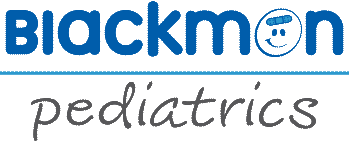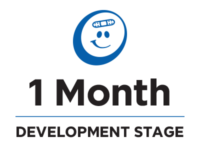Downloadable Files
- Development Stage 1 Month, Well Child Visit
- 1 Month Screening - SWYC
- 1 Month Screening - CCSN
- Vaccinations
DEVELOPMENT
Daily Activities
- Crying gradually becomes less frequent
- Displays greater variety of emotions: distress, excitement, delight
- May begin to sleep through the night!!!
- Smiles, gurgles, coos
- Quiets down when held
- Starts to lift head briefly
- May show distress when adult leaves
Motor Skills
- Movements become smoother
- May lift chest momentarily
- Discovers hands and fingers
- Grasps objects
- Head lag remains
Vision
- Eyes begin to focus better with twelve inch field
- Prefers objects with contrast
- May follow objects by moving head side to side
Hearing
- Able to discern a male from female voice
- Knows the difference between friendly and angry voices
FEEDING
Your baby still needs only breast milk or infant formula to continue healthly growth. Most babies are taking approximately four ounces every three hours. Now is not the time for cereal. We’ll cover solids in detail at the four month visit. Always hold your baby during feeding time. This will help your baby learn that you are there to meet his/her needs.
SAFETY TIPS
- Never leave your child alone, except in a crib.
- Avoid choking hazards and suffocation
- Use a crib with slats not more the 2 3/8” apart
- Place your baby in the bed on his/her back ONLY.
- Keep pillows, animals and extra blankets out of the crib. Keep the crib sides up.
- Never eat, drink, or carry anything hot while you are holding the baby
- Set water heater temperature to a max of120ºF (50ºC).
- Never allow smoke near your baby.
- Use an approved infant car safety seat. Follow instructions for proper installation. Parents should wear seat belts to set good example.
- Avoid sunscreen and bug spray until six months.
NO WORRIES
Each child is unique. It is therefore difficult to describe exactly what should be expected at each stage of a child’s development. While certain behaviors and physical milestones tend to occur at certain ages, a wide spectrum of growth and behavior for each age is normal. These guidelines are offered as a way of showing a general progression through the developmental stages rather than as fixed requirements for normal development at specific ages. It is perfectly natural for a child to attain some milestones earlier and others later as they continue to grow and learn.
A LITTLE NOTE:
Almost all babies develop nasal congestion during the third or fourth week. This is usually normal and does not mean your child is ill. We recommend saline irrigation and a bulb syringe as the best treatment. Saline solution can be made at home by combining eight ounces of water with 1/4 tsp. table salt and a pinch of baking soda. This may be kept in the refrigerator for several days.
CONSTIPATION: WHAT IS IT?
Although we hope our children will pass one to two bowel movements every day, we do not become concerned unless your child has not passed any bowel movement for four days. Frequently only patience is required. Call us if you need further help.
FUN ACTIVITIES WITH YOUR ONE MONTH OLD
- Cherish those night time feedings you will miss them when they are over.
- Share music, especially classical—Dr. Greg endorses jazz as well.
- And, by all means snuggle with baby.
- Encourage siblings to participate in care.
CALL US IMMEDIATELY IF:
- Your baby develops a fever over 100.5 axillary (rectal). We discourage the use of ear thermometers.
- Your baby is irritable and you cannot calm him/her.






